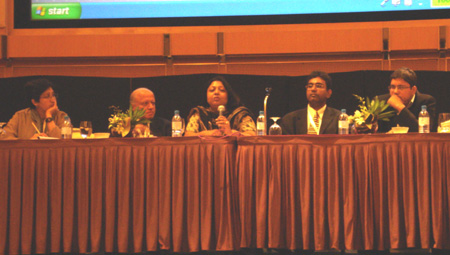GeSCI-CSDMS at GK3
India as a Trendsetter for Successful Multi-stakeholder Partnerships
GeSCI and CSDMS saw representation at the third Global Knowledge Conference (GK3) held in Kuala Lumpur, Malaysia from 11th – 13th December. The event included a panel discussion on ‘India as a trendsetter for successful multi-stakeholder partnerships’ with a group eminent panellists including Prof M S Swaminathan and senior representation from GeSCI, CSDMS, UNDP and IDRC. The discussion focussed on the role of multi-stakeholder partnerships in ICT for development in the context of education and community development.
The session was led by CSDMS, and aimed to showcase India as a trendsetter in the concept of ‘Glocalisation’ i.e. ‘Think Globally, Act Locally’ and understand the mechanism of MSPs for networking and knowledge sharing by communities of practitioners to build a network for continuous peer-to-peer learning. “We have all the components of being a trendsetter in MSPs”, said Prof Swaminathan. He shared the achievements of the Mission 2007 movement to make each village a knowledge centre and highlighted and the role of partnerships with the government, private and civil society sector in providing connectivity, content creation, capacity building and knowledge-based applications and solutions. He underlined the principle of technology development as a tool to improve people’s quality of life, income and skills, he asserted that the acceptance, adoption and spread of technology will depend upon addressing the user’s needs.
 This was followed by introduction to the National Policy on ICT in School Education, an initiative by the MHRD, supported by GeSCI in India. Ashish Garg, Country Programme Co-ordinator (India), GeSCI, highlighted the role of Multi Stake Holder Partnerships (MSPs) in building a participatory process which was collaborative, consultative and inclusive. ICT 4D requires an enabling policy , a regulatory environment, access to basic infrastructure, accelerated development of basic skills, development of application, content, ICT applications and many more. Such a wide range of requirements needs strategic alliances between different actors at the National, Regional and International levels. She focussed on the need to pool resources – knowledge and learning; because no single actor in society can deliver services to address the complexities of sustainable dev, or can public initiatives alone meet the challenges in ICT for Development.
This was followed by introduction to the National Policy on ICT in School Education, an initiative by the MHRD, supported by GeSCI in India. Ashish Garg, Country Programme Co-ordinator (India), GeSCI, highlighted the role of Multi Stake Holder Partnerships (MSPs) in building a participatory process which was collaborative, consultative and inclusive. ICT 4D requires an enabling policy , a regulatory environment, access to basic infrastructure, accelerated development of basic skills, development of application, content, ICT applications and many more. Such a wide range of requirements needs strategic alliances between different actors at the National, Regional and International levels. She focussed on the need to pool resources – knowledge and learning; because no single actor in society can deliver services to address the complexities of sustainable dev, or can public initiatives alone meet the challenges in ICT for Development.
The successful examples of tele-centres were highlighted by Dr Basheerhamad Shadrach, Senior Program Officer, International Development Research Centre and Asia Program Lead, telecentre.org as mechanisms of service delivery in rural and remote areas. He also flagged the evergreen revolution to use technology as a tool to create jobs and opportunities in rural areas to take right decision and improve and upgrade traditional practices and use technical knowledge to their advantage.
Mr Ravi Gupta, Director CSDMS highlighted the need to develop communities of practice in thematic areas of application of ICTs in education, health, governance and other applied sectors to move into the next phase of sectoral applications of ICTs and building partnerships.


